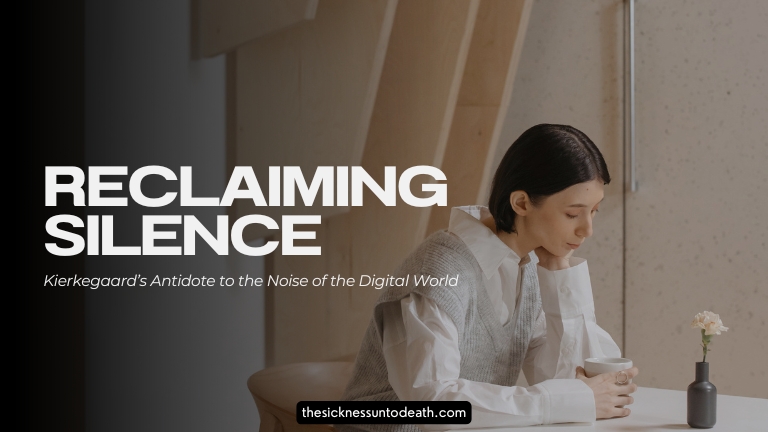Explore Kierkegaard’s call to solitude and inward reflection as a means to reconnect with faith in an overstimulated culture.
Ping. Scroll. Swipe. Refresh.
We live in a world where noise never stops. From the moment we wake to the minute we fall asleep, we’re bombarded—by notifications, news, opinions, entertainment, and the pressure to stay connected. But in this hyper-connected culture, one thing has become dangerously rare: silence.
And without silence, we lose something vital—not just peace of mind, but connection to ourselves, and to God.
Long before smartphones or social media, Søren Kierkegaard saw the dangers of constant distraction. He wrote about it as “the levelling”—a kind of spiritual numbness that occurs when the self is drowned out by the crowd, by busyness, by noise.
His remedy? Solitude. Inwardness. Silence.
The Soul’s Need for Stillness
Kierkegaard believed that silence is not just an absence of sound—it is a space where the self can meet the eternal. A sacred pause. A clearing where truth can be heard.
“The present state of the world and all of life is diseased. If I were a doctor and asked for my advice, I should reply: Create silence.”
This was in the 1800s. Imagine what he would say now.
In a culture addicted to stimulation, silence feels foreign. Even frightening. But Kierkegaard insisted it’s essential—not just for mental clarity, but for spiritual survival.
Lost in the Digital Crowd
Every day, we’re pulled in a hundred directions. We consume more than we reflect. We react before we pause. We speak more than we listen.
Kierkegaard’s warning was clear: the more we allow ourselves to be shaped by the external world—the crowd, the chatter, the trends—the more we risk losing our inwardness. And without inwardness, we become detached from our true self.
That’s why silence isn’t optional. It’s a radical act of faith.
Silence as a Spiritual Practice
For Kierkegaard, silence wasn’t about escape. It was about returning—to the self, to God, to what truly matters.
In silence:
- We stop performing and start listening.
- We begin to notice what’s real and what’s noise.
- We allow room for reflection, prayer, and presence.
Silence reconnects us not only to ourselves but to the divine voice that is always whispering beneath the surface of life.
“As long as a person remains in the crowd, he does not come to himself in the truth of the relationship with God.”
Reclaiming Silence in the Modern World
You don’t need a monastery or remote retreat to practise silence. You just need intention.
Try this:
- Begin your day with 5 minutes of complete stillness—no phone, no agenda.
- Take silent walks where you resist the urge to scroll or listen to a podcast.
- Let prayer or journalling become a space of inward conversation, not outward noise.
- End your day not with screens, but with silence—let your soul breathe.
These small acts can open deep wells of peace, purpose, and presence.
Final Thoughts
Kierkegaard’s call to silence is more relevant now than ever. In a digital age that thrives on stimulation, choosing stillness is a spiritual rebellion. It’s a way of saying: My soul matters more than my feed. My faith more than my notifications. My inward life more than outward noise.
Because sometimes, the most powerful thing we can do is not say more—but listen.
So pause. Breathe. Turn inward.
Reclaim the silence. That’s where the real conversation begins.

